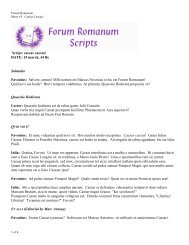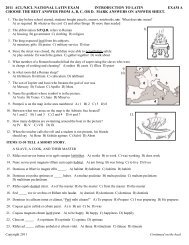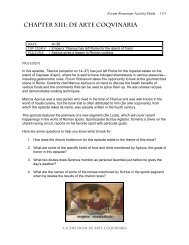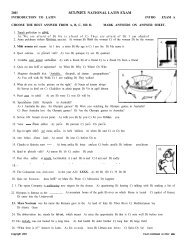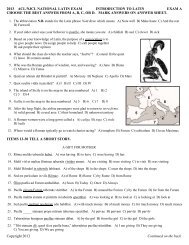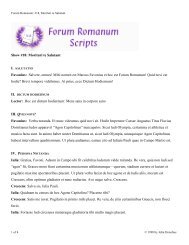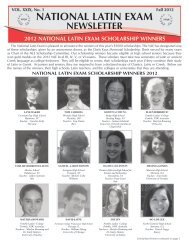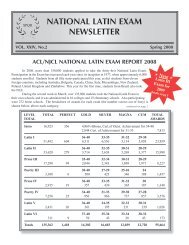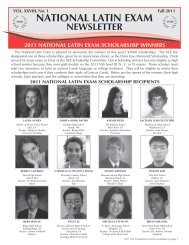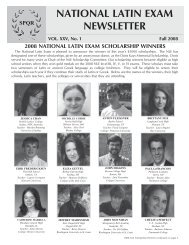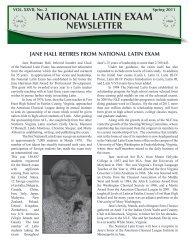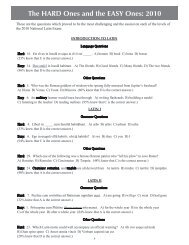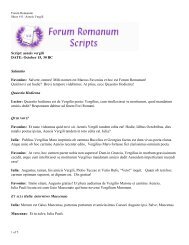2009 acl/njcl national latin exam introduction to latin intro exam a ...
2009 acl/njcl national latin exam introduction to latin intro exam a ...
2009 acl/njcl national latin exam introduction to latin intro exam a ...
Create successful ePaper yourself
Turn your PDF publications into a flip-book with our unique Google optimized e-Paper software.
27. Which of the following was said <strong>to</strong> be a slave who became one of the legendary kings of Rome?<br />
A) Servius Tullius B) Cincinnatus C) Marc An<strong>to</strong>ny D) Augustus<br />
28. Who prevented Lars Porsena and the Etruscans from crossing the bridge over the Tiber River in Rome’s early<br />
days? A) Romulus B) Appius Claudius C) Horatius D) Julius Caesar<br />
29. Locate Germānia on the map. A) 2 B) 4 C) 5 D) 6<br />
30. Locate Sicilia on the map. A) 1 B) 3 C) 7 D) 8<br />
READ THE PASSAGE AND ANSWER THE QUESTIONS.<br />
THE STRANGE RELATIONSHIP OF PICUS AND CIRCE<br />
A king and a witch do not see eye <strong>to</strong> eye.<br />
Ōlim erat rēx nōmine Pīcus. Prope rēgiam Pīcī habitābat maga clāra, Circē.<br />
Circē magnam et malam potentiam habēbat; saepe virōs aut in bēstiās aut in avēs<br />
mūtābat. Circē Pīcum vīdit et statim amāvit. Rēx autem magam nōn amābat<br />
quod uxōrem pulchram iam habēbat. Circē īrāta erat et Pīcum pūnīre cupiēbat.<br />
“Crās corōnam rēgis Pīcus nōn geret,” inquit, “sed cristam avis!”<br />
Postrīdiē rēx populum ad magnam cēnam invītāvit. Ante cēnam Pīcus<br />
cum paucīs amīcīs in silvam propinquam ambulāvit. Circē quoque in silvam<br />
sēcrētō ambulāvit et in altā arbore sēdit. Mox amīcī rēgis spectāculum mīrum<br />
vīdērunt, nam Circē formam Pīcī mūtāvit. Rēx nōn iam corōnam gerēbat; cristam<br />
habēbat. Iam manūs Pīcī erant ālae; Pīcus habēbat pedēs avis. Nāsum nōn habēbat<br />
sed rostrum. Pennās multōrum colōrum gerēbat. Vōx nōn iam erat virī sed avis.<br />
\ Et ubi tempus erat cēnae, Pīcus in trīclīnium nōn ambulāvit sed volāvit. Posteā<br />
in silvīs et hortīs habitāvit; numquam iterum formam hūmānam habuit.<br />
31. Picus and Circe (line 1) were A) friends B) sister and brother C) married D) neighbors<br />
32. Circe’s power (line 2) is described as A) healing B) minimal C) evil D) beneficial<br />
33. In line 3, Picus became A) an evil king B) the object of Circe’s affection C) very ill D) the husband of Circe<br />
34. In lines 3-4 (Rēx…habēbat), we learn that A) Circe was beautiful B) Picus was already married<br />
C) Circe became Picus’ wife D) the witch did not love the king<br />
35. The best translation for geret (line 5) is A) was wearing B) has worn C) wore D) will wear<br />
36. Line 6 reveals that A) Picus was treating his people <strong>to</strong> a dinner B) Picus’ subjects were suffering from famine<br />
C) the next day the king had no dinner D) the people offered a dinner for the king<br />
37. When Picus entered the forest (lines 6-7), he A) was alone B) sat in a tree C) had some friends with him<br />
D) had already dined<br />
38. In line 8, spectāculum mīrum refers <strong>to</strong> A) the transformation of Picus B) the appearance of Circe<br />
C) the dinner D) Circe’s speech<br />
39. In lines 9-11 (Rēx…avis), A) the new Picus is described B) birds invade the palace C) Circe dies<br />
D) men engage in a fierce fight<br />
40. From Posteā…habuit (lines 12-13) we learn that the king A) enjoyed having his human features again<br />
B) searched for Circe in his garden C) never saw Circe again D) no longer lived in his palace<br />
Copyright <strong>2009</strong><br />
Copyright <strong>2009</strong><br />
29.<br />
30.<br />
6<br />
4<br />
7<br />
1 rēgiam = palace; maga = witch<br />
2 potentiam = power; avēs = birds<br />
3 mūtābat = used <strong>to</strong> change<br />
4 pūnīre = <strong>to</strong> punish<br />
5 corōnam = crown; cristam = crest<br />
6 Postrīdiē = on the following day<br />
7 paucīs = a few; propinquam = nearby<br />
8 mīrum = strange<br />
9<br />
10 ālae = wings<br />
11 rostrum = beak; Pennās = feathers<br />
12 volāvit = flew<br />
13 numquam = never<br />
2<br />
3<br />
8<br />
1<br />
5



